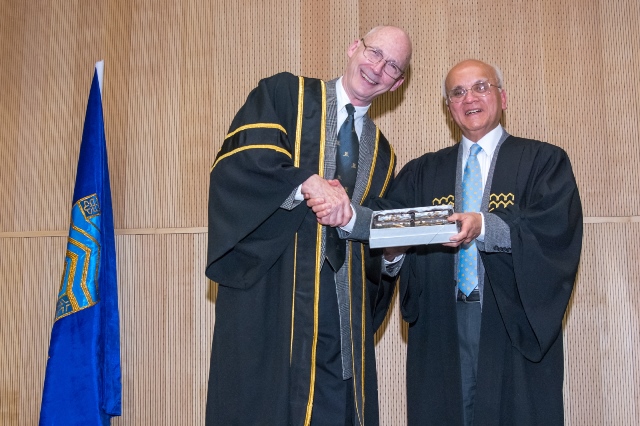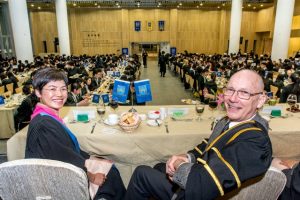Leading a More Satisfying Life

The College’s High Table Dinner on 12 February 2014 had Prof. Michael Harris Bond, Professor Emeritus of Psychology, The Chinese University of Hong Kong, to speak on leading a more satisfying life from a psychological perspective. He gave the audience interesting questions to ponder right at the beginning: “How do we get through our everyday life and how can we flourish in face of our innate limitations like gender, age and socio-economic status? Why do some people do better at living than others?”
Professor Bond shared his reflection on “satisfying life” with reference to the findings by Dr. George E. Vaillant, Director of the Study of Adult Development at the Harvard University Health Service, who has studied more than 800 men and women, following them from adolescence into old age, and seeking clues to the behaviors that translate into happy and healthy longevity. Dr. Vaillant wrote in his book Aging Well: “It is social aptitude that leads to successful aging, not intellectual brilliance or parental social class.” Professor Bond pinpointed that health, self-control, emotional stability and a warm family environment each greatly affects how satisfied we are in lifetime — and we might not be fated by our inborn uncontrollable factors.
Social relationship is a sustaining factor for a satisfying life, according to Professor Bond. He remarked that warm connections, the elements that transcend genetic endowments, are necessary. Like what Dr. Dan Siegel said, “The more we connect with others and embrace the reality of our interconnected nature, the more we’ll live with meaning, compassion, equanimity, and purpose.” Dr. Siegel is a clinical professor of psychiatry at the UCLA School of Medicine.
“Our subjective well-being can be improved by informed, active self-regulation,” Professor Bond added. We have the responsibility for our growth. In face of the inborn temperament and family environment contributed by our birth parents, we can still choose to lead a life with autonomy by doing regular exercise, rejecting smoking and abusing alcohols, as well as developing mature boundaries and coping strategies. He reminded the audience to enhance self-awareness to identify their own dissatisfaction and take remedial actions accordingly. “After all, jade must be cut and chiseled to make it a useful vessel,” Professor Bond quoted in fluent Cantonese.
Prof. Michael Harris Bond joined The Chinese University of Hong Kong in 1974, serving as Professor of Psychology. After teaching for 34 years, he retired in 2008 and remains a Professor Emeritus at the University. Professor Bond is now a Visiting Chair Professor at the Department of Management and Marketing at Hong Kong Polytechnic University. Professor Bond’s research interests include social perception, the social psychology of language use, impression management and cross-cultural social psychology. Professor Bond has published extensively on wide-range topics in psychology and received many professional awards. His most recent one is the Outstanding International Psychologist Award for 2013 from the Division of International Psychology of the American Psychological Association.



